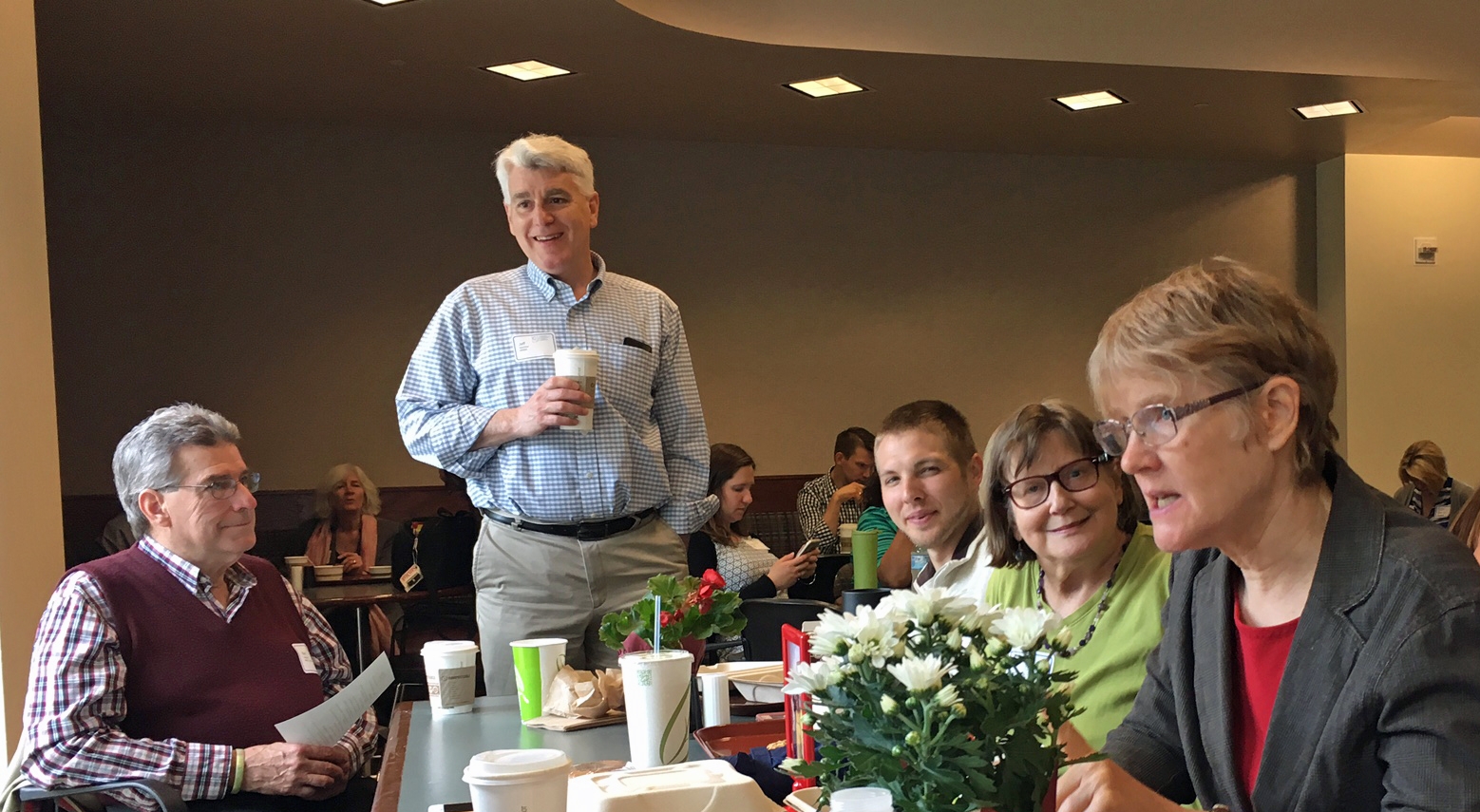MNBIA Public Policy Director Jeff Nachbar Turns Citizens into Advocates
By Ellen Fortini
Jeff Nachbar claims to have the best job in the world. “Every day I get to get out of bed and try to help people who are committed to affecting change,” he says. A mission-focused professional with a long-standing career in advocacy and community organizing, Jeff found his place with the Minnesota Brain Injury Alliance (MNBIA) in 2005 as the Public Policy Director.
The self-described “Minneapolis kid” was eager to find a mission-based non-profit that was working to achieve objectives. “I was looking for opportunities to do more public policy change with a cause that fit my values and my beliefs,” he says. That MNBIA had a public policy staff position meant Jeff could focus his efforts on advocacy without the additional task of fundraising. As a graduate of the University of Minnesota with a degree in Environmental Policy, Jeff says his studies gave him a working knowledge of the connections among systems.
“My history is in public policy, grassroots organizing, advocacy, politics, and elections, so I came from the policy angle,” he explains. “I have always been affiliated with public health and social justice, so it was a good fit.”
“My history is in public policy, grassroots organizing, advocacy, politics, and elections, so I came from the policy angle,” he explains. “I have always been affiliated with public health and social justice, so it was a good fit.”
MNBIA Public Policy Director Jeff Nachbar Turns Citizens into Advocates
By Ellen Fortini
Jeff Nachbar claims to have the best job in the world. “Every day I get to get out of bed and try to help people who are committed to affecting change,” he says. A mission-focused professional with a long-standing career in advocacy and community organizing, Jeff found his place with the Minnesota Brain Injury Alliance (MNBIA) in 2005 as the Public Policy Director.
The self-described “Minneapolis kid” was eager to find a mission-based non-profit that was working to achieve objectives. “I was looking for opportunities to do more public policy change with a cause that fit my values and my beliefs,” he says. That MNBIA had a public policy staff position meant Jeff could focus his efforts on advocacy without the additional task of fundraising. As a graduate of the University of Minnesota with a degree in Environmental Policy, Jeff says his studies gave him a working knowledge of the connections among systems.
“My history is in public policy, grassroots organizing, advocacy, politics, and elections, so I came from the policy angle,” he explains. “I have always been affiliated with public health and social justice, so it was a good fit.”
“My history is in public policy, grassroots organizing, advocacy, politics, and elections, so I came from the policy angle,” he explains. “I have always been affiliated with public health and social justice, so it was a good fit.”
That good fit included an understanding of how to effectively position the organization to get the most from their efforts. He offers a concise description of their ongoing goals: to change policy to improve supports and services and protect the state budget from cuts that hurt people with brain injuries.
But Jeff doesn’t do this important work alone. “We develop a network of citizen advocates and teach them about the process, and provide opportunities to engage in the process, and create meaningful change and empower them to get involved,” he shares. For him, it’s an obvious winning strategy. “You get people involved and engage with their politicians. We are always looking for opportunities for people to bring personal issues they care about into the political arena, and how I can help them promote those ideas.”
One of those recent ideas became what is known in Minnesota as Mitchell’s Law, which is named after an MNBIA advocate who was working in the oil fields in North Dakota and was involved in a car crash. His parents were located in Twin Cities and there was no way for emergency responders to find and notify a family member. This led to his parents and him envisioning a bill that allowed people to voluntarily put emergency contacts in the drivers’ license data base in Minnesota.
Another idea that came from a citizen advocate is now known as Cassy’s Law. When Tim Barry’s daughter Cassy had a stroke, her frontal lobe was damaged, and due to her lack of impulse control, she ended up caught in the cycle of the criminal justice system—she was convicted of crime and sent to an institution, although she had no sense of consequences. The proposed bill would require judges to do neuropsychological evaluations prior to sentencing.
The MNBIA has also been involved in brain injury prevention issues. In lieu of a motorcycle helmet law in Minnesota, the organization has been working on a requirement that motorcyclists carry personal injury insurance so if they do get in a crash, they have coverage to pay for their medical care. “We’re not blaming people for having a brain injury,” Jeff emphasizes. “We’re trying to counteract the argument that the decision to wear a helmet is nothing more than a personal freedom. There is no shortage of problems and things we can work on.”
For Jeff, the start of even-numbered years means additional work. “Currently, we’re at the start of the biannual budget cycle,” he says, “And now with COVID, and with the economy, a lot of states are seeing a reduction in tax revenues and seeing pressures being put on their state budgets.” Less than ideal when so many people are experiencing a greater need than ever for services. “It’s a really tough place to be and one of our biggest drivers of our public policy work is the state budget every couple of years,” he says.
Another aspect of Jeff’s work is lobbying, both for the Alliance and with his advocates. “Direct lobbying is what I do when I talk to legislators. Grassroots lobbying is where I work with advocates – survivors, family members, and professionals – to teach them how to contact their legislators,” explains Jeff. When not at the State Capitol engaging their citizen advocates, then they’re working to organize citizens to develop their capacity.
To help citizen advocates grow into their roles, Jeff holds a Citizen Advocate Academy, where people affected by brain injury and their loved ones are trained to tell their stories as a powerful political message that can create change. They learn elevator speeches, how a bill becomes a law, how to testify, how to write a letter, media advocacy, and more. Additionally, they attend Tuesdays at the Capitol, which are currently virtual, and gives the advocates the opportunity to exercise their skills and share their stories. There are also important community-level events such as the Town Hall Forums, where advocates can testify in front of invited legislators. “I build that capacity in folks to get engaged and then engage them,” Jeff states simply. “It’s not that you train them and turn them loose; you train them and then provide opportunities for them.”
He explains that every year, the board sets the public policy priority session and agenda due in large part to the Alliance’s proposals and suggestions. As Minnesota is on a two-year cycle, “It’s sort of a tick-tock thing,” says Jeff. “The first year we set the main priorities and the next year is an adjustment of what we’ve done and what is left to do, and then we start again in a couple years.” During the annual needs assessment, the Alliance gathers as much information as they can about the issues in the community. “It’s never a problem finding enough issues, the problem is prioritizing what we can make the biggest difference on: what affects the most people and what has the highest impact in people,” he affirms.
Specific issues the Alliance has successfully spearheaded or assisted in creating policy change for include:
- Primary seatbelt legislation, which gives police the authority to pull someone over for not wearing a seatbelt.
- Changes in Driving While Impaired (DWI) enforcement.
- Adjusting Medicaid Spenddown, which affected people who were above the income standard for Medical Assistance (MA) due to receiving Social Security Disability Insurance (SSDI).
Each of these has been achieved in conjunction with other disability organizations and coalitions, including the Minnesota Consortium for Citizens with Disabilities, the Children with Disabilities Coalition, the This Is Medicaid Coalition, and the DWI Task Force.
“I don’t wear my politics on my sleeve when I am out lobbying,” Jeff insists. “I believe in progressive policies and society taking care of those with needs, and that it’s not a dog-eat-dog, cutthroat world where we all need to go out and tear each other down to get what we want.”
The politics of late Minnesota Senator Paul Wellstone have served as inspiration for Jeff, as the senator’s work in environmental issues, labor issues, and healthcare were well-received in the US Senate before his untimely death in 2002 in a plane crash at age 58. “I believe in the power of people to affect change,” says Jeff, “and that our system is designed to protect the status quo and the power of those who have it as opposed to disrupt it and change it.” Jeff knows what it takes to see lasting change. “It’s about the power of individuals to affect change. It’s participation in our political system. It’s that each of us has the same human rights as someone who owns a corporation.”
He also finds inspiration in those he trains. “I really admire the courage the brain injury advocates have every day to want to do something, and they face really significant challenges.” He estimates there are 50 core members of the group who regularly participate in all topics, and another 100 who focus on one issue at a time. “There’s a real camaraderie, a real solid team that comes together. Some have different political points of view, but [they] respect each other and work together.”
Covid has changed a lot about what Jeff and his team can do for the advocates, both in positive and challenging ways. “A lot of the advocates do it because they care about things they want to change, but a lot of them do it for the social element,” he says. “They love doing this. We have a blast together.” To keep them together, the advocates have continued meeting virtually, but Jeff acknowledges all the screen time can be hard on those with brain injuries.
Other pandemic-based hardships Jeff has noticed include the isolation some advocates experience, as well as the lack of resources for up-to-date technology and sufficient mobile-phone data minutes, while some struggle with the cognitive abilities needed to understand the technology itself. “We now have advocates from rural Minnesota who before would have had a difficult time coming to the Capitol but can now testify over Zoom and attend the Zoom version of the Citizen Advocate Academy,” Jeff enthuses.
Lisa Black is such an advocate, who has focused on transportation needs for the disability community for many years. She was able to testify in front of the transportation committee at Disability Day Off the Capitol via Zoom from her farm in rural Minnesota, something she would never have been able to do before Covid due to logistical limitations.
Having well-informed, engaged advocates seems to help all around when it comes to educating legislators and encouraging other advocates. “A legislator would much rather speak to a constituent than a parade of lobbyists,” Jeff tells. “It’s not only great and rewarding; it’s effective.”
Jeff also believes in staff development and has educated interns, assistants, and team members who have eventually left to become policy directors for other Minnesota non-profits. But when he found himself without a staff member to manage the grassroots component just before the latest legislative session, Jeff decided to take on the role himself.
“I popped back into what I used to do, and have really enjoyed that. It’s where I came from and I have been working the soil beneath my fingernails, so to speak.” Due to Covid, though, it’s almost been like entering a brand-new field. “I had to figure out how to do this [role] all over again,” he admits.
His belief in the empowerment-based model, which entails teaching advocates how the system works, giving them opportunities to engage, holding elected officials accountable, building relationships, staying engaged, becoming a team, and having power in numbers, still works and holds true for him all these years later. “Now I am just learning a whole new way to do it,” he says.
Some of the best advice Jeff ever received was that when it comes to making a difference, “It’s a marathon, not a sprint.” He believes taking the long view, keeping eyes on the prize, and being strategic are key. He has also learned, “Don’t chase shiny objects. Stay focused. Politics moves with glacial speed, and change does not happen very fast. Tell the truth. Credibility is hard to establish but it’s really hard to re-establish.”
Facilitating from the background and helping to push things forward is where Jeff feels most comfortable in a professional setting. Whether it is seeing leaders develop or helping advocates succeed publicly, Jeff makes his mark encouraging others.
When not at the office, he plays ice hockey and has served as a youth hockey referee for 30 consecutive years, only taking this last season off. He loves his dogs, fishing, camping, canoeing, biking, and hiking. “I stay active,” he says.
Staying active seems to be a theme for Jeff Nachbar. Whether it’s at the rink or at the State Capitol, he’s always involved and encouraging others. “Most people don’t get out of bed and think, ‘Gosh, how can I participate in my democracy today? What do I want to do today to be part of this process?’ But it’s the only game in town if you want to affect change: you have to participate.”
For those who are anxious about getting involved with public policy and advocacy, Jeff firmly believes it’s everyone’s game. “I don’t want people to think it’s this big complex thing that they have to understand to make a difference,” he emphasizes. “Just take a piece of it and do it.”
*Ellen Fortini is a globetrotting writer, editor, and public relations professional. She currently resides in Las Vegas, Nevada.
ABOUT BRAIN INJURY ALLIANCE OF ARIZONA
The Brain Injury Alliance of Arizona (BIAAZ) is the only statewide nonprofit organization dedicated to improving the lives of adults and children with all types of brain injuries through prevention, advocacy, awareness and education. BIAAZ also houses the Arizona Brain Health Resource Center, a collection of educational information and neuro-specific resources for brain injury survivors, caregivers, family members and professionals.
What began in 1983 as a grassroots effort has grown into a strong statewide presence, providing valuable life-long resources and community support for individuals with all types of brain trauma at no charge.
The Brain Injury Alliance of Arizona:
- Works with Congressional Brain Injury Task Force
- Houses Arizona Brain Health Resource Center
- Hosts Statewide Opioid Use Disorder & Cognitive Impairment Workgroup
- Has Statewide Opioid Use Disorder & Cognitive Impairment Response team with peer support, training, and family wraparound services
- Facilitates Brain Health Advisory Council
- Manages statewide Neuro Info-Line: 888-500-9165








